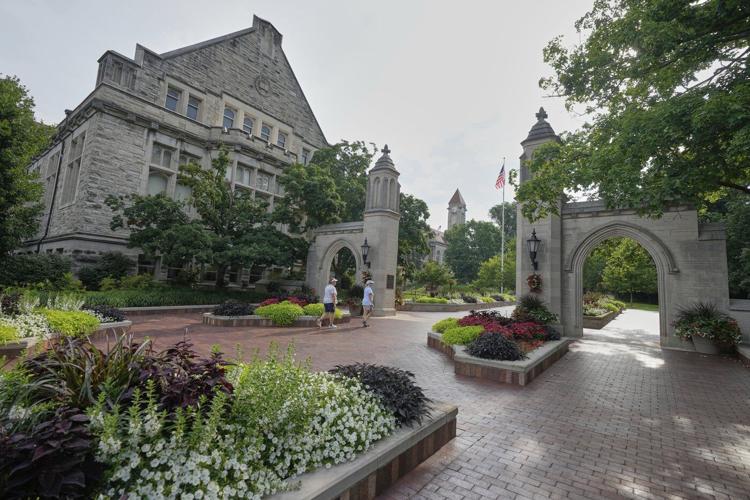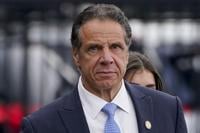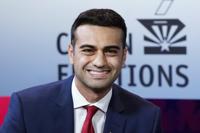Ken Beckley never went to Harvard, but he has been wearing a crimson Harvard cap in a show of solidarity. As he sees it, the Trump administration's attacks on the school echo a case of government overreach at his own alma mater, Indiana University.
Beckley, a former head of the school's alumni association, rallied fellow graduates this spring in an unsuccessful effort to stop Gov. , a Republican, from removing three alumni-elected members from Indiana University’s Board of Trustees and handpicking their replacements.
No government effort to influence a university — private or public — has gotten more attention than the clash at Harvard, where the Trump administration has frozen billions of dollars in as it seeks . But far beyond the Ivy League, Republican officials are targeting public universities in several states with efforts seeking similar ends.
“What’s happened nationally is now affecting Indiana,” said Beckley, who bought Harvard caps in bulk and passes them out to friends.
Officials in conservative states took aim at higher education before President Donald Trump began his second term, driven in part by the belief that colleges are out of touch — too liberal and loading up students with too much debt. The first efforts focused on , an academic framework centered on the idea that racism is embedded in the nation’s institutions, and then on programs.
Since Trump took office, officials in states including Indiana, Florida, Ohio, Texas, Iowa and Idaho increasingly have focused on university governance — rules for who picks university presidents and boards and how much control they exert over curriculums and faculty .
As at Harvard, which Trump has decried as overly influenced by liberal thinking, those state officials have sought to reduce the power of faculty members and students.
“They’ve realized that they can take a bit of a step further, that they can advance their policy priorities through those levers they have through the state university system,” said Preston Cooper, a senior fellow who studies higher education policy at the conservative American Enterprise Institute.
State officials push for more conservative leadership
In Indiana, Braun said he picked new trustees who will guide the school “back in the right direction.” They include an anti-abortion attorney and who was disciplined because she criticized the company's policy requiring employees to be vaccinated against COVID-19.
Braun's administration has ramped up scrutiny of hiring practices at colleges statewide. Indiana's attorney general, Todd Rokita, has to the University of Notre Dame, Butler University and DePauw University questioning the legality of their DEI programs.
Butler, a private, liberal arts school in Indianapolis, was founded by an abolitionist in the decade leading up to the Civil War and admitted women and students of color from the start.
“I hope that Butler will uphold the standards they were founded on,” said Edyn Curry, president of Butler’s Black Student Union.
In Florida, the state university system board in June rejected longtime academic for the presidency at the University of Florida, despite a unanimous vote of approval by the school's own Board of Trustees. The unprecedented reversal followed criticism from conservatives about Ono's past support for DEI programs.
That followed the conservative makeover of , a small liberal arts school once known as the state’s most progressive. After Republican Gov. Ron DeSantis appointed a group of conservatives to its governing board, many faculty left, including Amy Reid, who now manages a team focused on higher education at the free-expression group PEN America.
“When our students started organizing at New College, one of their slogans was ‘Your Campus is Next,’” said Reid, who saw the gender studies program she directed defunded and then cut. “So no, we’re not surprised when you see other states redefining what can be in a general education class, because we’ve seen it happen already.”
Changes have met limited resistance
The changes at several public universities are proceeding without battles of the kind seen at Harvard. In a standoff seen widely as of private universities' independence, Harvard has filed lawsuits against the administration's moves to cut its federal funding and block its ability to host international students.
In Iowa, new DEI restrictions are taking effect in July for community colleges. And the board that governs the state's three public universities is weighing doing something similar to , where a new law imposes restrictions on requiring students to take DEI-related courses to meet graduation requirements.
Historically, the Iowa board has been focused on big-picture issues like setting tuition rates and approving degree programs. Now, there's a perceived sense that faculty should not be solely responsible for academic matters and that the trustees should play a more active role, said Joseph Yockey, a professor at the University of Iowa College of Law and the former president of Iowa’s faculty senate.
“What we started to see more recently is trustees losing confidence,” Yockey said.
A new law in Ohio at public colleges and universities and also strips faculty of certain collective bargaining rights and tenure protections.
There are few guardrails limiting how far oversight boards can change public institutions, said Isabel McMullen, a doctoral candidate at the University of Wisconsin who researches higher education.
“For a board that really does want to wreak havoc on an institution and overthrow a bunch of different programs, I think if a board is interested in doing that, I don’t really see what’s stopping them aside from students and faculty really organizing against it,” McMullen said.
Defenders of academic freedom see threats on several fronts
The initiatives on state and federal levels have led to widespread concerns about an erosion of college's independence from politics, said Isaac Kamola, director of the Center for the Defense of Academic Freedom at the American Association of University Professors.
“They have to not only face an attack from the state legislature, but also from the federal government as well,” said Kamola, who is also a professor of political science at Trinity College in Hartford, Connecticut.
In Texas, Republican Gov. Greg Abbott signed a pair of bills in June that impose new limits on student protests and give gubernatorial-appointed boards that oversee the state’s universities to control the curriculum and eliminate degree programs.
Cameron Samuels, executive director of Students Engaged in Advancing Texas, an advocacy group, said politicians in the state are taking control of universities to dictate what is acceptable.
“When someone controls the dissemination of ideas, that is a really dangerous sign for the future of democracy,” Samuels said.
The 21-year-old who is transgender and nonbinary went to college in Massachusetts and got into Harvard for graduate school, but as the Trump administration began targeting the institution, he instead chose to return to his home state and attend the University of Texas in Austin.
“I at least knew what to expect,” he said.
____
The Associated Press’ education coverage receives financial support from multiple private foundations. AP is solely responsible for all content. Find AP’s for working with philanthropies, a of supporters and funded coverage areas at .
















































